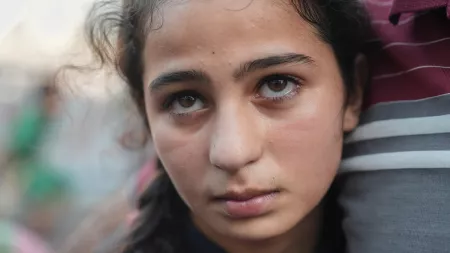After a week of respite, the truce in the Israel-Gaza war ended today, reigniting the immense risks of more destruction, trauma, and killings in Gaza. CARE's Acting Deputy Regional Director for the Middle East and North Africa, Hiba Tibi highlighted her extreme concern for the millions of civilians in the Strip:
“We are deeply alarmed by the news of the resumption of fighting. Gaza is already the deadliest place on earth to be a child. Resuming the bombing means hell on earth has returned for children and their families, with no end in sight.
For weeks, hunger, thirst, disease, and displacement have reached levels never seen before in Gaza.
The truce allowed aid agencies like CARE to deliver some much-needed humanitarian aid to over two million people. Every drop of water, every bag of wheat we supplied made a difference, but the aid delivered remained woefully inadequate compared to the needs.
After 50 days of constant fighting and fearing for their lives, the people in Gaza aid agencies managed to reach were finally able to see some smiles on their children’s faces, stock up on some food and water, and feel like they could breathe again. Now, their breath is choked in terror.
Once again, children are petrified, hearing bombs dropping from the skies, fearing each moment might be their last.
CARE is particularly concerned about the situation of women and children. Around 47% of the 2.2 million Palestinians in the Gaza Strip are children and their hearts break with every missile launched, with every bomb dropped. The level of trauma we are seeing is unprecedented and over 15,000 people have reportedly lost their lives – almost 70% of them children and women.
While resumed fighting will equal more bloodshed, a higher death toll, and immense levels of destruction, it also prepares the ground for other more silent killers.
Malnutrition, cold, and lack of clean water and hygiene are a deadly combination. We are already seeing the spread of disease infecting and killing those who have survived the bombing and airstrikes. Shelter conditions in crowded camps are deteriorating, fuel supplies are shrinking, and the use of hazardous materials to stay warm during the cold and rainy winter nights is resulting in grave health impacts.
Mothers are reporting eating and drinking only once per day to make sure their children don’t go to bed hungry.
Nearly 80% of the people in Gaza are already displaced, particularly from north Gaza, and with fighting increasing in the south there is now nowhere else to go. Imagine, trying to keep your children safe and healthy in such a dire humanitarian situation!
The parties to the conflict must prioritize the preservation of human life above all else. We call for a lasting ceasefire, unhindered humanitarian access through all borders, and a lasting peace agreement.”
For media inquiries, please contact Iolanda Jaquemet, Senior Humanitarian Communications Coordinator, CARE International via: [email protected].
